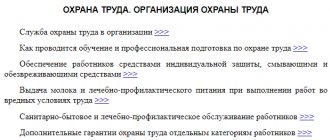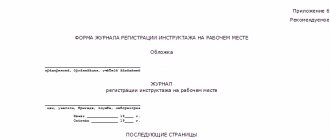Why is it mandatory to conduct induction training on civil defense in an organization from 05/02/2017?
Civil defense is not only the ability of the population to correctly resist the actions of the enemy during military conflicts, but also its competent behavior in emergency situations, including in peacetime (Article 1 of the Law “On Civil Defense” dated 12.02. 1998 No. 28-FZ).
It is with the aim of strengthening the second component that a number of significant changes were made to the Regulations on training in civil defense, approved by Decree of the Government of the Russian Federation dated November 2, 2000 No. 841 (Resolution of the Government of the Russian Federation dated April 19, 2017 No. 470), which entered into force on May 2, 2017. These changes include:
- expanding the list of persons subject to training;
- introduction of training carried out by courses and establishment of frequency;
- the emergence of additional training responsibilities for responsible persons across the entire vertical of bodies responsible for civil defense training.
The circle of persons responsible for such training also includes employers (regardless of their form of existence). According to the new edition of the Regulations on Civil Defense training, they were obliged to organize for the working population (clause 4 of the appendix to the Regulations on Civil Defense training):
- conducting introductory training in civil defense;
- completing periodic course training on civil defense issues;
- conducting regular training events in civil defense.
Failure to fulfill these duties is fraught with quite serious administrative fines (Clause 2 of Article 20.7 of the Code of Administrative Offenses of the Russian Federation) related to officials (10–20 thousand rubles) and organizations (100–200 thousand rubles).
Is it possible not to carry out
The law obliges the employer to create a structural unit in the organization to perform duties in the field of civil defense, prevention and liquidation of emergencies (Article 9 of the Law of February 12, 1998 No. 28-FZ, Article 14 of the Law of December 21, 1994 No. 68-FZ). The creation of a separate department can be replaced by the appointment of an employee with similar responsibilities.
The number of employees in this area, including the possibility of combining such a position with any other, depends on the staffing level of the enterprise; type of activity and, as a consequence, category of economic entity under civil defense; obligations to continue the activities of the organization during the period of hostilities.
Based on the requirements of clause 9 of the Regulations, approved by Order of the Ministry of Emergency Situations of Russia dated May 23, 2017 No. 230, the appointment of persons to the position of persons responsible in the field of emergency situations is possible if the latter have special training in the relevant field. Employees who do not have the required knowledge must be sent to take specialized courses on the basis of a government agency that has the right to receive training of this kind.
The process ends with an oral random test of the knowledge acquired by the employee. The final results of training and assessment are entered into the “Special Logbook for Civil Defense and Emergency Situations” indicating the signature of the person being instructed and the instructor, as well as the date of the event.
Each enterprise must have a department or employee responsible for civil defense and emergency situations. The number of workers employed in this area is determined based on the size of the organization and its category (see Order of the Ministry of Emergency Situations of Russia dated July 31, 2006 No. 440 “On approval of the regulations on structural units (employees) of organizations authorized to solve problems in the field of civil defense”). This provision stipulates that all organizations belong to two categories:
- Organizations that continue to operate during wartime.
- Organizations not operating in wartime.
That is, to perform such duties, you can either introduce a separate position (relevant for large and strategically important enterprises) or assign them to a labor protection specialist or other competent employee with the necessary knowledge and skills.
The professional standard for such a position has not yet been developed, but, according to the ECKD and Order No. 440, the following requirements are imposed on a civil defense specialist:
- he must have a higher technical education or secondary specialized education and at least 5 years of work experience;
- he must undergo special training in the field of civil defense.
You can assign duties to an already working employee using a free-form order on the assignment of duties (responsibilities).
If a separate position is introduced and a new employee is hired for it (including on a part-time basis), the hiring is formalized by a standard order using the unified T-1 form (or another similar one approved by the organization).
The responsibilities of a civil defense officer typically include the following:
- organizing and conducting events in the field of civil defense and emergencies, drawing up calendar plans for events;
- development of training and training programs;
- instructing and other methodological assistance to workers in the field of civil defense and emergency situations.
According to Resolution No. 470, starting from 2020, all newly hired employees of organizations must take a training course during the first month of work. Although the need to conduct such events is enshrined in law, it is not superfluous to issue an order regulating who conducts briefings, with whom and in what time frame.
The procedure for conducting the briefing includes the following steps.
- The responsible person informs the employee of all the necessary information, or he or she is given an introductory civil defense instruction manual for self-study.
- The person in charge orally checks the knowledge acquired by the employee.
- The employee signs a copy of the instructions kept by the employer and receives his own copy.
- Information about the briefing is recorded in a special journal. This will allow, if necessary, to confirm the fact of its implementation.
The form of the journal is not legally fixed, but it is advisable to enter the following columns:
- date of;
- name of the briefing;
- volume;
- Full name and signature of the person being instructed;
- position and full name of the specialist who conducted the instruction, his signature.
Practical training can also be carried out at the enterprise in order to consolidate the acquired theoretical skills. The frequency of their implementation is recorded in the schedule, and the fact is recorded in a journal of a similar form.
It is not possible; management (officials) of the enterprise may be fined for failure to inform the employer when hiring a new employee. The fine is:
- for organizational leaders – from 10,000 to 20,000 rubles;
- for an enterprise – from 100,000 to 200,000 rubles.
Only a specialist with training in emergency situations and civil defense has the right to conduct lectures on behavior in case of accidents or martial law.
He is appointed by a separate order at the enterprise. You can specifically hire a former employee of the military commissariat, the Ministry of Emergency Situations, or a life safety teacher.
The same responsibilities can be assigned to a labor safety inspector, if there is one at the enterprise.
The selection of the person responsible for training employees in safety rules is carried out depending on the staffing schedule of the enterprise and its policies.
It is very important to take into account the qualifications of the invited specialist - it must allow him to fulfill all the legal requirements that apply to conducting lectures on civil defense at enterprises.
The law does not clearly state who conducts induction training in civil defense. However in practice it should be:
- specialist in civil defense and emergency situations (separate staff position);
- occupational safety specialist;
- another employee (usually a retired military man).
Keep in mind: the person responsible for conducting introductory briefings in civil defense is appointed by a separate order.
Of course, such a person must be competent in civil defense and emergency situations. That is, undergo appropriate training (a separate course or additional professional education).
The main responsibility of such employees is to develop an induction program, as well as conduct training and exercises according to plans.
VIGO can be carried out either by the entrepreneur himself or the head of a small enterprise, or by a person specially appointed by them. Large organizations have entire departments dedicated to occupational safety or civil defense and emergency protection. In any case, the responsible person is appointed by order of the organization.
The main thing is that such a specialist:
- knew the basics of protection in an emergency and methods of providing emergency assistance;
- presented the specifics of the field in which the enterprise operates;
- took into account the specific location of the enterprise.
In addition, it must be remembered that there are special enterprises classified as civil defense, and organizations that continue to operate in wartime. Their leaders and employees of civil defense services, including those whose responsibilities are charged with conducting VIGO, must necessarily have additional vocational education or undergo course training in specialized educational organizations.
What should be included in the order for induction training on civil defense at the enterprise?
An absolute innovation in 2020 in terms of civil defense training for employers was the obligation to conduct introductory training on the relevant topic. For this responsibility, the latest edition of the Regulations on training in terms of civil defense establishes 2 key requirements (subparagraph “d”, paragraph 5):
- the need to instruct newly hired employees during the first month of their work;
- the ability to independently develop a training program.
Thus, the employer must independently determine:
- who conducts the introductory briefing on civil defense, i.e., appoint a person with the necessary knowledge;
- what is included in the appropriate briefing program, taking into account the specifics of the activity being performed.
The training program is usually developed and approved as a separate independent document. A similar program developed for a similar occupational safety procedure can serve as a model for it in terms of form. And as a basis for the content, it is possible to use the Model course training program for the working population in the field of civil defense and protection from emergency situations, approved by document of the Ministry of Emergency Situations of Russia dated February 22, 2017 No. 2-4-71-8-14.
Instructions regarding the organization of anti-terrorism protection of workplaces also have something in common with the instructions regarding civil defense. Read more about this here.
Instruction must be carried out by a person who has not only undergone special training in civil defense, but also regularly improves the level of his knowledge in this area. This can be either a specialist who deals only with civil defense issues, or an employee who combines several functions (for example, conducting introductory briefings on labor protection).
The employer will issue a separate order on the appointment of the person responsible for conducting the training. This document will also contain a link to the program in accordance with which this procedure will be carried out.
One of the points of such an order may be approval of the journal form for recording the fact of conducting introductory briefing on civil defense or a reference to its form approved by another organizational and administrative document. As a sample of such a journal, you can take a similar document used to reflect the fact that introductory briefing on labor protection has been completed.
For information on how to prepare a log of introductory briefing on labor protection, read the material “Journal of introductory briefing on labor protection - sample.”
New responsibilities of organizations and individual entrepreneurs: introductory briefing on civil defense 2020
So, starting from May 2, 2020, absolutely all organizations of all forms of ownership and type of management are obliged to:
- develop special programs for conducting induction training on civil defense for all employees;
- conduct induction training on civil defense with all new employees within the first month after employment;
- Regularly plan and conduct civil defense exercises and drills.
Course training for heads of subordinate organizations or services classified in accordance with the established procedure as civil defense categories will have to be organized by federal executive authorities. Regional authorities must organize and conduct thematic and problem-based training seminars (webinars) on civil defense twice a year with all managers and employees of structural units that are authorized to solve problems in the field of civil defense, as well as instruct municipalities and their subordinate organizations. In doing so, they should pay special attention to organizations that, by law, must continue to operate in wartime. As a result, a certain vertical for civil defense training has been created, the top link of which is the Russian Ministry of Emergency Situations, which, in turn, is tasked with conducting special training seminars (webinars) on civil defense with managers and employees of structural divisions of federal executive authorities at least twice a year. And at the bottom level there are organizations and individual entrepreneurs who will convey information to ordinary citizens.
Currently, there are many commercial organizations that provide paid training in the basics of civil engineering. Such courses are conducted on the basis of Model programs of the Ministry of Emergency Situations of Russia (No. 2-4-87-36-14 of November 28, 2013). If the head of the organization or any employee authorized by him completes such courses, he will receive documents giving him the right to conduct training among old and new employees. Although the Ministry of Emergency Situations itself should conduct such training, it has not yet approved the corresponding regulations on special schools. Moreover, a draft resolution of the Government of the Russian Federation has appeared, which abolishes mandatory civil defense training for all employees of commercial organizations. The Ministry of Emergency Situations intends to retain such an obligation only for those companies that are categorized under civil defense: these are public institutions and enterprises that ensure the functioning of the military-industrial complex.
The procedure for conducting introductory training in Civil Defense in 2020
The procedure for conducting induction training in Civil Defense does not have any fundamental differences from other types of induction training, except for the timing of its implementation. So, for example, without an introductory briefing on labor protection, an employee simply cannot be allowed to work, i.e. it is carried out on the very first working day. While a whole calendar month is allotted for civil defense training.
Read about the procedure for conducting induction training on occupational safety issues in this article.
In other respects, civil defense induction will follow the usual pattern for such an event. The employee should be familiarized with:
- with the specifics of the employer’s activities, which may be fraught with the occurrence of emergency situations;
- what he should do in each of these situations;
- practical techniques for handling individual and collective protective equipment, providing first aid to victims.
During familiarization, visual material (diagrams, posters, videos) can be used.
At the end of the briefing process, you should check the employee’s complete assimilation of what was stated using test questions.
The fact of a successful briefing is recorded in the log of such events. It will be necessary to include entries about the positions and full names of the instructor and the person being instructed, the date of the instruction, and the presence of signatures of both specified persons.
What is included in the contents of the document (sample)
A sample civil defense induction program should take into account that all organizations are different, located in different places, and, accordingly, emergency situations arise in them differently. There is little to worry about in the desert, and an ammonia explosion is more likely to occur in a refrigeration plant than in a pasta factory. Therefore, the instructions will have to be adjusted depending on the specifics of the organization’s activities.
The induction program for civil defense is drawn up at the enterprise, taking into account the following factors:
- the specifics of the enterprise - the field of activity, the nature of working conditions, harmful factors, the presence of workshops and departments that are dangerous from the point of view of emergency situations, flammable, explosive substances, poisons and chemicals, etc.;
- features of the organizational and personnel structure of the enterprise;
- features of the location of the organization - the presence of nearby hazardous production or strategically important facilities, railway tracks, etc.
Typically the training consists of the following parts:
- Introductory. Includes goals, timeframes and procedures.
- Thematic plan. It reflects the aspects covered during the briefing, preferably indicating the time it will take to study each of them.
- Questions for control.
- Plan of practical lessons for developing skills.
It is advisable to cover the following points during the briefing:
- regulatory framework in the field of civil defense and emergency situations;
- organization of civil defense and emergency situations in the region and at the enterprise;
- actions of personnel in the event of a threat of direct attack, chemical, radiation attack and other military threats;
- rules of behavior in the event of a natural emergency, both typical for a given area and uncharacteristic;
- procedure for actions in case of accidents and man-made disasters, both internal (within the enterprise) and external (happened from outside);
- behavior during the threat and commission of terrorist acts;
- first aid rules;
- measures to minimize damage and eliminate the consequences of emergencies.
Results
From 05/02/2017, employers (both legal entities and individual entrepreneurs) have a new obligation - to conduct introductory training in Civil Defense for newly hired persons.
The legislative period for this procedure is 1 month from the date of hiring the employee. All other issues (development of a briefing program and a log form in which the fact of briefing is recorded, appointment of the person responsible for the process) are left to the discretion of the employer. You can find more complete information on the topic in ConsultantPlus. Full and free access to the system for 2 days.
CIVIL DEFENSE INTRODUCTION PROGRAM
1. INTRODUCTORY PART
1.1. Introductory training in civil defense (hereinafter referred to as civil defense) is carried out for those hired after May 2, 2020. employees of the organization within a month after their employment.
1.2. The purpose of the induction training is to familiarize newly hired persons with the civil defense and RSChS system operating at Vector LLC, to explain the procedure for action in the event of a threat or occurrence of emergency situations (hereinafter referred to as emergencies) of a natural and man-made nature, as well as dangers arising from military actions.
1.3. Introductory briefing in civil defense is carried out according to a program developed on the basis of legislative and other regulatory legal acts of the Russian Federation, taking into account the specifics of the organization’s activities and approved in the prescribed manner by the employer.
The duration of the instruction is set in accordance with the approved program.
1.4. Introductory training in civil defense and emergency situations is carried out by an employee specially authorized to solve problems in the field of civil defense and emergency situations, who is assigned these responsibilities by order of the employer.
1.5. Conducting introductory training on civil defense and emergency situations includes familiarizing workers with general information about the enterprise, basic technological processes, potentially hazardous objects, actions in the event of a threat or occurrence of an emergency.
1.6. Introductory training in civil defense and emergency situations ends with an oral test of acquired knowledge by the person conducting the training.
1.7. The results of the introductory briefing are entered into the Civil Defense Introductory Briefing Journal, indicating the signature of the person being instructed and the signature of the instructing person, as well as the date of the briefing.
vvodnyj-instruktazh-po-GO
2. THEMATIC PLAN FOR INTRODUCTORY INSTRUCTION IN CIVIL DEFENSE
| № Topics | Subject | Time to study the topic, min. |
| 1. | Introductory part | 5 |
| 2. | The civil defense and emergency system operating at the enterprise | 10 |
| 3. | Legal regulation for preparing for defense and protecting the population, material and cultural values from military hazards, emergencies and fires | 15 |
| 4. | Dangers arising during military operations or as a result of these actions, during emergencies and fires. Basic measures to prepare for protection and to protect the population from them | 25 |
| 5. | Actions of the organization's employees in the event of a threat or natural emergency | 15 |
| 6. | Actions of organization employees in man-made emergencies, as well as in the event of the threat and commission of terrorist acts | 35 |
| 7. | Actions of employees of the organization in the conditions of negative and dangerous factors of everyday life | 10 |
| 8. | Actions of organization employees in case of fire | 20 |
| 9. | Providing first aid. First aid instructions. Nursing Basics | 15 |
| Total: | 150 min. | |
3. LIST OF MAIN QUESTIONS IN INTRODUCTORY INSTRUCTION ON CIVIL DEFENSE
3.1. The direction of the organization's activities, its purpose, functions, main technological processes.
3.2. Structure and tasks of the organization's civil defense and RSChS system. Rights, responsibilities, composition of forces and assets of its units and formations.
3.3. Legislation of the Russian Federation in the field of civil defense, protection of the population from natural and man-made emergencies and ensuring fire safety.
3.4. Basic terms and concepts.
3.5. Rights and responsibilities of citizens in the field of civil defense, protection from natural and man-made emergencies and fire safety.
3.6. The main local regulations in the field of civil defense and emergency situations that are in force at the enterprise. Regulations on the organization and conduct of civil defense. Regulations on the object link of the OP RSChS . Instructions for actions in case of threat and emergency situations . Civil defense plan.
3.7. Military dangers and their inherent characteristics. Damaging factors of nuclear, chemical, bacteriological and conventional weapons.
3.8.Types and characteristics of sources of emergency situations. Damaging factors of sources of emergency situations. Types of fires and their damaging factors.
3.9. Alert. Local warning systems . Actions of employees of the organization (organization) when notifying about emergency situations in peacetime and about dangers arising during military operations or as a result of these actions. Alert signals.
3.10. Evacuation and dispersal. Protecting the population through evacuation. Evacuation and its goals. Principles and methods of evacuation. Evacuation authorities. The procedure for carrying out evacuation at the enterprise.
3.11. Organization of engineering protection of the population. Classification of protective structures. Shelters and their main elements. Anti-radiation shelters, their purposes and main elements. Shelters of the simplest type and their structure. The procedure for filling protective structures and staying in them.
3.12. Personal protective equipment for respiratory organs and skin. Medical personal protective equipment. Purpose and rules of their use.
3.13. Concepts about dangerous natural phenomena, natural disasters and sources of natural emergencies.
3.14. Classification and characteristics of natural emergencies.
3.15. The most likely emergency situations typical for the area where the organization is located. Their causes and consequences. Actions of employees upon notification, during and after their occurrence.
3.16. Concepts of accident and catastrophe. Classification of man-made emergency situations and their characteristics.
3.17. A list of potentially dangerous objects that may affect the normal functioning of the organization, their characteristics.
3.18. Possible situation at the enterprise in the event of major accidents and man-made disasters.
3.19. Actions of workers: when notifying about an accident at a dangerous object; during evacuation; when there is no possibility of evacuation; when leaving the infected zone, etc.
3.20. General information about fires and explosions, their occurrence and development. The main damaging factors of fire and explosion. Prevention of fires and explosions. Actions of workers in the event of fires and explosions.
3.21. Types of terrorist acts, their common and distinctive features. Rules and procedures for the behavior of the population in the event of a threat or commission of a terrorist act.
3.22. Signs indicating the possibility of the presence of an explosive device and actions when objects similar to an explosive device are detected. Actions to take when receiving a telephone message about a terrorist threat. Rules for handling anonymous materials containing terrorist threats. Actions during hostage taking and release.
3.23. Possible negative and dangerous factors of a domestic nature.
3.24. Rules of action to ensure personal safety in crowded places, in case of fire, in public transport, on water bodies.
3.25. Ways to prevent and overcome panic and panicky moods.
3.26. Actions in case of road accidents, poisoning, animal bites.
3.27. Basic fire safety in the workplace and at home.
3.28. Fire safety regime of the organization. Alert system and instructions for workers' actions in case of fire. Evacuation plan.
3.29. Actions upon detection of smoke and fire, as well as upon fire warning signals and evacuation.
3.30. Responsibilities of citizens to comply with fire safety rules. Responsibility for violations of fire safety requirements.
3.31. Fire extinguishing equipment. Actions of workers to prevent fire, as well as to use primary fire extinguishing agents.
3.32. Basic rules for providing first aid in emergency situations. Rules and techniques for performing artificial respiration and indirect cardiac massage.
3.33. First aid for bleeding and wounds. Ways to stop bleeding. Types of dressings. Rules and techniques for applying bandages to wounds.
3.34. First aid for fractures. Techniques and methods of immobilization using standard and improvised means. Methods and rules for transporting and carrying victims.
3.35. First aid for bruises, dislocations, chemical and thermal burns, poisoning, frostbite, fainting, electric shock, heat and sunstroke.
3.36. Fundamentals of nursing. Possible composition of a home first aid kit.
DOWNLOAD: Programma-provedeniya-vvodnogo-instruktazha-po-GO
Similar articles:
- Who conducts the induction training Who conducts the induction training? How to organize? Where to spend it? Program and instructions for conducting induction training. List of questions. Responsibility for violation...
- List of documents on civil defense and RSChS issues List of documents on civil defense and RSChS issues recommended for development in municipalities and at facilities 1. List of documents for categorized…
- Order on the creation of the CoES and PB Order on the creation of the CoES and PB. Emergency prevention and response. Ensuring constant readiness for action...
What are the innovations?
– The new government decree has added several more responsibilities. Tell us more about them, please.
– The changes introduced by Decree of the Government of the Russian Federation dated April 19, 2017 N 470 and which entered into force on May 2, 2020, essentially detail and supplement previously established responsibilities in this area. Now enterprises must develop a program for conducting introductory briefings on civil defense with employees of the organization.
At the same time, employers need to schedule civil defense induction training for new hires. It is difficult to provide a sample, since the training program in this case is created by the legal entity itself. In this format, the employee can be familiarized with the structure of the organization in the field of civil defense and emergency management, the responsible persons of the company, the main documents, and the material and technical base.
Another innovation is the planning and conduct of exercises and various types of training. They vary depending on the specifics of the enterprise.
– Tatyana Sergeevna, please explain who and how should conduct induction training on civil defense and emergency situations in an organization? Where can I get training programs?
Responsibility for failure to conduct induction training
For employees to undergo training, they must:
- Adopt a local act on the procedure for conducting training. This includes appointing someone who will conduct civil defense training when hiring new employees.
- Approve the program.
- Develop instructions on civil defense, which a new employee will be introduced to upon hiring.
Either the head of the company or the person assigned to it will be responsible for organizing the training. As a rule, the director does not have time for this. The enterprise issues a local act on conducting introductory training in civil defense, which indicates who can do this, and the director approves the job description and appoints by order who should conduct it. The person who is responsible for such instruction must improve his qualifications at least once every five years (paragraph 2, paragraph 4 of Resolution No. 841).
Next, you need to prepare a program. The company develops it independently. To avoid mistakes, you can use the recommendations and take the program from Section IV of the Recommendations as a basis. The approximate program of the Ministry of Emergency Situations will also help to build a training system (approved by the Ministry of Emergency Situations of Russia on February 22, 2017 No. 2-4-71-8-14). In 2020, preschool educational institutions and schools can post introductory programs on civil defense and emergency situations on their official websites (see example).
You should not copy the entire text. It is necessary to take into account a number of factors, including the activities of the organization: hazardous production factors and locations, and others.
If the company does not approve the specified document and does not put its provisions into effect, it faces liability.
For example, the individual entrepreneur did not challenge the decision to impose an administrative penalty, which was issued by the Ministry of Emergency Situations based on the results of a scheduled on-site inspection. Among other violations, inspectors identified the absence of a worker training program, which must be approved by the manager. The court considered a fine of 30 thousand rubles legal. (resolution of the Federal Antimonopoly Service of the West Siberian District dated June 16, 2014 in case No. A46-7618/2013).
In another case, the Main Directorate of the Ministry of Emergency Situations of Russia, as part of state supervision in the field of civil defense, conducted an on-site inspection. The administrative body concluded that the person being inspected does not comply with the procedure for carrying out the necessary measures:
- officials have not undergone mandatory civil defense training;
- the organization does not provide training on civil and emergency situations when hiring an employee and during the first month of work, etc.
These actions constitute an offense (Part 2 of Article 20.7 of the Code of Administrative Offenses of the Russian Federation). The court recognized the actions of the Ministry of Emergency Situations as lawful and upheld the decision (resolution of the Supreme Court of the Republic of Khakassia dated November 29, 2017 in case No. 4a-288/2017).
New employees and persons seconded for 30 days or more undergo the first briefing (clause 1.5 of the Recommendations). In particular, they are introduced to the instructions that the organization has developed in case of emergency. To test knowledge, the examiner orally conducts a survey. An approximate list can be found in the Recommendations (clause 4.2). If the student has not mastered the program, an o is written in the journal. Instruction is carried out again after 30 days.
The fact of completing the training must be recorded in the briefing log. The standard form can be taken from the Recommendations (Section IV). When the training is completed, the employee and the person responsible for the instruction sign and date the specified document. The teacher makes a note about checking the assimilation of the information material.
Teachers of the subject “Fundamentals of Life Safety” and the discipline “Life Safety” of organizations that carry out educational activities in the main general education programs at school (except for educational programs of preschool educational institutions), educational programs of secondary vocational education and educational programs of higher education are subject to civil defense training (clause b. h.
For example, a government agency imposed a fine of 100 thousand rubles on a school. (Part 2 of Article 20.7 of the Code of Administrative Offenses of the Russian Federation). The school indicated that at the time of consideration of the case, an action plan had appeared in the institution, and the person in charge gave instructions to students on actions in emergency situations. The head of the school has completed a training course according to the required program; the certificate is valid for five years.
At the time of the inspection, there was no logbook for registering briefings on civil defense and emergency situations, but briefings were carried out. The court upheld the ruling. The violation is confirmed by the protocol and other documents. There is no evidence in the case materials that the school was not able to fulfill the requirements (decision of the Ilyinsky District Court dated July 23, 2013 in case No. 12-33/2013).
Civil defense is not only the ability of the population to correctly resist the actions of the enemy during military conflicts, but also its competent behavior in emergency situations, including in peacetime (Article 1 of the Law “On Civil Defense” dated 12.02. 1998 No. 28-FZ).
It is with the aim of strengthening the second component that a number of significant changes were made to the Regulations on training in civil defense, approved by Decree of the Government of the Russian Federation dated November 2, 2000 No. 841 (Resolution of the Government of the Russian Federation dated April 19, 2017 No. 470), which entered into force on May 2, 2017. These changes include:
- expanding the list of persons subject to training;
- introduction of training carried out by courses and establishment of frequency;
- the emergence of additional training responsibilities for responsible persons across the entire vertical of bodies responsible for civil defense training.
The circle of persons responsible for such training also includes employers (regardless of their form of existence). According to the new edition of the Regulations on Civil Defense training, they were obliged to organize for the working population (clause 4 of the appendix to the Regulations on Civil Defense training):
- conducting introductory training in civil defense;
- completing periodic course training on civil defense issues;
- conducting regular training events in civil defense.
Failure to fulfill these duties is fraught with quite serious administrative fines (Clause 2 of Article 20.7 of the Code of Administrative Offenses of the Russian Federation) related to officials (10–20 thousand rubles) and organizations (100–200 thousand rubles).
The procedure for conducting induction training in Civil Defense does not have any fundamental differences from other types of induction training, except for the timing of its implementation. So, for example, without an introductory briefing on labor protection, an employee simply cannot be allowed to work, i.e. it is carried out on the very first working day. While a whole calendar month is allotted for civil defense training.
Read about the procedure for conducting induction training on occupational safety issues in this article.
In other respects, civil defense induction will follow the usual pattern for such an event. The employee should be familiarized with:
- with the specifics of the employer’s activities, which may be fraught with the occurrence of emergency situations;
- what he should do in each of these situations;
- practical techniques for handling individual and collective protective equipment, providing first aid to victims.
During familiarization, visual material (diagrams, posters, videos) can be used.
At the end of the briefing process, you should check the employee’s complete assimilation of what was stated using test questions.
The fact of a successful briefing is recorded in the log of such events. It will be necessary to include entries about the positions and full names of the instructor and the person being instructed, the date of the instruction, and the presence of signatures of both specified persons.
One of the forms of civil defense training for the working population is undergoing induction training at the place of work (clause a(1) clause 4 of the Appendix to the Regulations, approved by Government Resolution No. 841 dated 02.11.2000).
Accordingly, employer-organizations are obliged (subclause d, clause 5 of the Regulations):
- develop a program for conducting introductory briefings on civil defense with your employees;
- organize and conduct induction training on civil defense with newly hired employees during the first month of their work.
To do this, the organization can issue an order on induction training in civil defense, on the basis of which the following can be developed:
- civil defense induction plan;
- the procedure for conducting induction training in civil defense and other documents.
Please note that there is no obligation for individual entrepreneurs to instruct their employees in civil defense.
Considering that induction training in civil defense is mandatory for all employers, administrative liability is provided for failure to conduct it. It is expressed in the form of a fine (part 1 of article 20.6, part 2 of article 20.7 of the Code of Administrative Offenses of the Russian Federation):
- for the head of an organization in the amount of 10,000 to 20,000 rubles;
- for organizations - from 100,000 to 200,000 rubles.
We talked about the introductory briefing magazine for civil defense and the program for such briefing in separate consultations.
In the spring, the Ministry of Emergency Situations announced a number of additions to such an event as introductory training for civil defense employees at the enterprise. If managers comply with all required requirements, their company will not be fined.
Management's obligation to instruct employees strictly no later than thirty days from the start of their activities became the main innovation of the spring of this year. According to the current provisions, familiarization with civil defense measures will be carried out by all organizations and individual entrepreneurs.
The regulations of the departments of the Ministry of Emergency Situations for Civil Defense clarify that its main subject is legal entities and all entrepreneurs, despite the area of their work and the number of employees present. Also, starting from the spring of this year, introductory briefing on civil defense in power grid organizations is completely mandatory.
Entrepreneurs will also be required to perform the following tasks:
- Program for induction training at modern enterprises.
- Education and training in civil defense.








